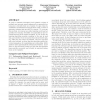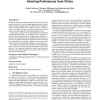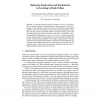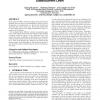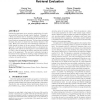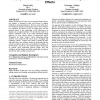142
click to vote
KDD
2012
ACM
13 years 4 months ago
2012
ACM
In order to minimize redundancy and optimize coverage of multiple user interests, search engines and recommender systems aim to diversify their set of results. To date, these dive...
128
click to vote
CIKM
2011
Springer
14 years 2 months ago
2011
Springer
Evaluating rankers using implicit feedback, such as clicks on documents in a result list, is an increasingly popular alternative to traditional evaluation methods based on explici...
151
click to vote
IRFC
2011
Springer
14 years 5 months ago
2011
Springer
The paper is concerned with the design and the evaluation of the combination of user interaction and informative content features for implicit and pseudo feedback-based document re...
141
click to vote
ECIR
2011
Springer
14 years 5 months ago
2011
Springer
Abstract. As retrieval systems become more complex, learning to rank approaches are being developed to automatically tune their parameters. Using online learning to rank approaches...
116
click to vote
SIGIR
2008
ACM
15 years 2 months ago
2008
ACM
We examine the effect of incorporating gaze-based attention feedback from the user on personalizing the search process. Employing eye tracking data, we keep track of document part...
105
click to vote
SIGIR
2010
ACM
15 years 6 months ago
2010
ACM
Traditional retrieval evaluation uses explicit relevance judgments which are expensive to collect. Relevance assessments inferred from implicit feedback such as click-through data...
119
click to vote
SIGIR
2010
ACM
15 years 6 months ago
2010
ACM
Interleaving experiments are an attractive methodology for evaluating retrieval functions through implicit feedback. Designed as a blind and unbiased test for eliciting a preferen...
153
click to vote
CIVR
2010
Springer
15 years 6 months ago
2010
Springer
This paper describes an approach to optimize query by visual example results, by combining visual features and implicit user feedback in interactive video retrieval. To this end, ...
115
click to vote
SIGIR
2004
ACM
15 years 7 months ago
2004
ACM
Recent research has had some success using the length of time a user displays a document in their web browser as implicit feedback for document preference. However, most studies h...
108
click to vote
SIGIR
2004
ACM
15 years 7 months ago
2004
ACM
We investigate how users interact with the results page of a WWW search engine using eye-tracking. The goal is to gain into how users browse the presented abstracts and how they s...
